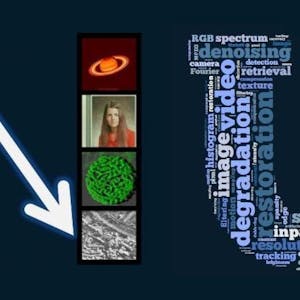Fundamentals of Digital Image and Video Processing
In this class you will learn the basic principles and tools used to process images and videos, and how to apply them in solving practical problems of commercial and scientific interests.Digital images and videos are everywhere these days – in thousands of scientific (e.g., astronomical, bio-medical), consumer, industrial, and artistic applications. Moreover they come in a wide range of the electromagnetic spectrum - from visible light and infrared to gamma rays and beyond. The ability to process image and video signals is therefore an incredibly important skill to master for engineering/science students, software developers, and practicing scientists. Digital image and video processing continues to enable the multimedia technology revolution we are experiencing today. Some important examples of image and video processing include the removal of degradations images suffer during acquisition (e.g., removing blur from a picture of a fast moving car), and the compression and transmission of images and videos (if you watch videos online, or share photos via a social media website, you use this everyday!), for economical storage and efficient transmission.
This course will cover the fundamentals of image and video processing. We will provide a mathematical framework to describe and analyze images and videos as two- and three-dimensional signals in the spatial, spatio-temporal, and frequency domains. In this class not only will you learn the theory behind fundamental processing tasks including image/video enhancement, recovery, and compression - but you will also learn how to perform these key processing tasks in practice using state-of-the-art techniques and tools. We will introduce and use a wide variety of such tools – from optimization toolboxes to statistical techniques. Emphasis on the special role sparsity plays in modern image and video processing will also be given. In all cases, example images and videos pertaining to specific application domains will be utilized.
None
Syllabus
Syllabus - What you will learn from this course
Week 1
Introduction to Image and Video Processing
Week 2
Signals and Systems
Week 3
Fourier Transform and Sampling
Week 4
Motion Estimation
Week 5
Image Enhancement
Week 6
Image Recovery: Part 1
Week 7
Image Recovery : Part 2
Week 8
Lossless Compression
Week 9
Image Compression
Week 10
Video Compression
Week 11
Image and Video Segmentation
Week 12
Sparsity
FAQ
When will I have access to the lectures and assignments?
Access to lectures and assignments depends on your type of enrollment. If you take a course in audit mode, you will be able to see most course materials for free. To access graded assignments and to earn a Certificate, you will need to purchase the Certificate experience, during or after your audit. If you don't see the audit option:
The course may not offer an audit option. You can try a Free Trial instead, or apply for Financial Aid.
The course may offer 'Full Course, No Certificate' instead. This option lets you see all course materials, submit required assessments, and get a final grade. This also means that you will not be able to purchase a Certificate experience.
What will I get if I purchase the Certificate?
When you purchase a Certificate you get access to all course materials, including graded assignments. Upon completing the course, your electronic Certificate will be added to your Accomplishments page - from there, you can print your Certificate or add it to your LinkedIn profile. If you only want to read and view the course content, you can audit the course for free.
Is financial aid available?
Yes. In select learning programs, you can apply for financial aid or a scholarship if you can’t afford the enrollment fee. If fin aid or scholarship is available for your learning program selection, you’ll find a link to apply on the description page.
Reviews
A course which looks hard at first glance but they lecturers made it look so easy and inspired us students to teach us. Thank you for the course.
Wonderful course....The mentor is knowledgable....the only drawback I find is it we dont find the answers to the assignment questions even after passing it.
AMAZING COURSE.
TAKES YOU THROUGH EVERY TOPIC IN IMAGE PROCESSING.
THIS COURSE GREATLY HELPED ME WITH UNIVERSITY STUDIES AS WELL,
THANK YOU NORTHWESTERN UNIVERSITY AND PROFESSOR AGGELOS K.
Great for learning image processing
This course include some important basic knowledge of signal processing as well as advanced topics and methods
